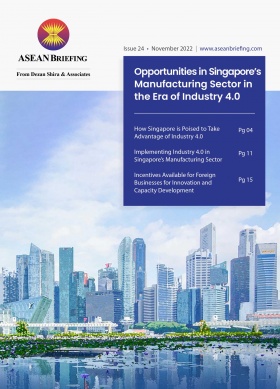Philippines Allows 100% Foreign Investment in Public Services
The Philippines has issued the implementing rules and regulations for the amendments to the Public Service Act. The Act allows for 100 percent foreign ownership of public services in the country such as railways and airports.
The Philippines government issued the implementing rules and regulations to the Public Service Act in late March 2023, which is set to impact foreign ownership of public services in the Philippines.
The Public Service Act allows 100 percent foreign ownership of public services in the Philippines. However, the Act was amended in February 2022 to clearly define the difference between public services and public utilities, since under the 1987 Constitution, only firms that were 60 percent Filipino-owned, were allowed to operate public utilities. Further, foreign ownership in public services classified as critical infrastructure such as telecommunications, airlines, railways, and subways, was limited to 40 percent.
The Act has since been revised again in March 2023 following extensive reviews with the public, legislators, and other key stakeholders.
What are the implementing rules and regulations?
100 percent foreign ownership of select public services
Starting April 1, 2023, select sectors such as railways, airports, expressways, and telecommunications are now open to 100 percent foreign ownership. Previously, these sectors were limited to 40 percent foreign ownership.
Restrictions on public utilities
The following public utilities have foreign ownership limited to 40 percent:
- Electricity distribution;
- Electricity transmission;
- Seaports;
- Water pipeline distribution and sewerage; and
- Public utility vehicles.
These systems are deemed vital and would have a debilitating impact on national security if they were incapacitated or destroyed.
Safeguarding national security
The government has placed several safeguards to guard national security. Among them is providing the President with the power to prohibit or suspend any foreign investments in public service upon the recommendation and review of a state agency.
There are also restrictions on foreign state-owned enterprises owning capital stock in a public utility or critical infrastructure. Moreover, there is a reciprocal clause in the Act that prevent foreign nationals from owning a majority share in critical infrastructure unless their country accords the same to the Philippines.Another safeguard is for businesses engaging in the telecommunications sector. They are obligated to meet the relevant ISO standards. operating public services will be mandated to perform annual audits to assess the company’s costs and quality of services.
Reforms in the Philippines continue
The amendment of the Public Service Act is part of the ongoing reforms in the Philippines to improve business competitiveness. The government has now allowed 100 percent foreign ownership of renewable energy projects as well as to fully own domestic enterprises (including micro-enterprises) in the Philippines.
The government is particularly eager for the country’s businesses, especially micro, small, and medium-sized enterprises (MSMEs) to benefit from these reforms by greater participation in the global value chains (GVCs). MSMEs are the backbone of the Filipino economy, accounting for 99 percent of businesses and 60 percent of total employment. However, Philippine MSMEs are weakly linked to GVCs.Through these reforms, the government is hoping to see greater foreign investment which in turn means better technical cooperation with local businesses and eventually enables them to realize economies of scale and develop better and more competitive products and services.
About Us
ASEAN Briefing is produced by Dezan Shira & Associates. The firm assists foreign investors throughout Asia and maintains offices throughout ASEAN, including in Singapore, Hanoi, Ho Chi Minh City, and Da Nang in Vietnam, in addition to Jakarta, in Indonesia. We also have partner firms in Malaysia, the Philippines, and Thailand as well as our practices in China and India. Please contact us at asean@dezshira.com or visit our website at www.dezshira.com.
- Previous Article An Overview of Indonesia’s Double Tax Avoidance Agreements
- Next Article Indonesia and Singapore Sign Six MoUs to Enhance Bilateral Ties








